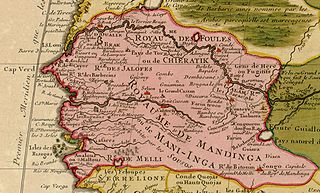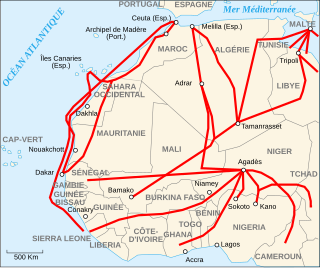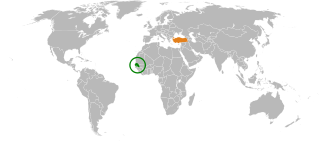Migration history
In early 1989, tensions arose between Mauritania and Senegal due to conflicts over water resources in the Sénégal River valley. As a result, white Mauritanian Moors in the Senegalese capital Dakar became the targets of communal violence, while in Mauritania itself, black Mauritanians came under suspicion as "Senegalese fifth columnists". [2] To prevent further violence, the governments of Mauritania and Senegal began to organise mutual repatriations of their citizens from each other's territories in April that year; however, Mauritania did not just remove Senegalese citizens, but an estimated 70,000 black Mauritanians as well. [3] Those expelled were largely of Halpuular ethnicity. [4] The border between the two countries would not be reopened until April 1992. [5]
Repatriation began slowly after the reopening of the border. Refugees returning to Trarza and Brakna generally found conditions to be good, but those going back to Gorgol and Guidimaka complained of continued discrimination by local authorities. [6] Reports in early 2013 indicated that returnees continued to face difficulties resettling in their former villages and regaining access to the lands they had once farmed due to their lack of identification documents. [7]

Senegal, officially the Republic of Senegal, is a country in West Africa. Senegal is bordered by Mauritania in the north, Mali to the east, Guinea to the southeast, and Guinea-Bissau to the southwest. Senegal nearly surrounds The Gambia, a country occupying a narrow sliver of land along the banks of the Gambia River, which separates Senegal's southern region of Casamance from the rest of the country. Senegal also shares a maritime border with Cape Verde. Senegal's economic and political capital is Dakar.

The history of Senegal is commonly divided into a number of periods, encompassing the prehistoric era, the precolonial period, colonialism, and the contemporary era.

Senegal’s first President, Léopold Senghor, advocated close relations with France and negotiation and compromise as the best means of resolving international differences after Senegal’s independence from its status as a French colony. To a large extent, the two succeeding presidents, Abdou Diouf and Abdoulaye Wade, have carried on Senghor's policies and philosophies. Senegal has long supported functional integration among French-speaking West African states through the West African Economic and Monetary Union.
Zenaga is a Berber language on the verge of extinction currently spoken in Mauritania and northern Senegal by a few hundred people. Zenaga Berber is spoken as a mother tongue from the town of Mederdra in southwestern Mauritania to the Atlantic coast and in northern Senegal. The language is recognized by the Mauritanian government.

The Mauritania–Senegal Border War was a conflict fought between the West African countries of Mauritania and Senegal along their shared border during 1989–1991. The conflict began around disputes over the two countries' River Senegal border and grazing rights, and resulted in the rupture of diplomatic relations between the two countries for several years, the creation of thousands of refugees from both sides, as well as having a significant impact on domestic Senegalese politics.

The Union of the Forces of Progress is a left leaning political party in Mauritania.

The African Liberation Forces of Mauritania is an illegal and exiled paramilitary organization for Black natives and inhabitants of Mauritania.

Mpack is a village in Niaguis Arrondissement, Ziguinchor Department, Ziguinchor Region in southern Senegal. Government statistics classified it as a rural community and recorded its population as 518 people in 72 households. It is located about seven kilometres from the regional capital of Ziguinchor. It is one of the endpoints of the 90-km long Oussouye-Kabrousse-Cap Skirring-Ziguinchor-Mpack road, which is being rebuilt with 17 billion CFA francs of funding from the European Union. The village used to be on the front lines of the Casamance Conflict between the Senegalese government and the Movement of Democratic Forces of Casamance.

Migrants' routes cover the main geographical routes from tropical Africa towards Europe taken by people attempting to gain residence and work opportunities unavailable in their home countries. Although most migrants have Europe as their intended destination, alternative routes are also directed towards South Africa and Asia.
In December 1984, Haidallah was deposed by Colonel Maaouya Ould Sid'Ahmed Taya, who, while retaining tight military control, relaxed the political climate. Ould Taya moderated Mauritania's previous pro-Algerian stance, and re-established ties with Morocco during the late 1980s. He deepened these ties during the late 1990s and early 2000s as part of Mauritania's drive to attract support from Western states and Western-aligned Arab states. Mauritania has not rescinded its recognition of Polisario's Western Saharan exile government, and remains on good terms with Algeria. Its position on the Western Sahara conflict has been, since the 1980s, one of strict neutrality.
Demba Diop was a Senegalese politician. He served as Minister of Youth and Sport under President Léopold Sédar Senghor and was Mayor of Mbour from 1966 to 1967.
Trade unionism is a powerful force in the politics, economy, and culture of Senegal, and was one of the earliest trades union movements to form in Francophone West Africa.
The Malian Party of Labour is a Marxist-Leninist party in Mali and a member of the coalition supporting the Alliance for Democracy in Mali of president Amadou Toumani Touré. Founded in 1965, it was prominent in the student resistance to the 1968-1991 military regime of General Moussa Traoré. It continues as an extra-parliamentary Hoxhaist-Communist faction within the Social-Democratic ADEMA-PASJ coalition, supporters of the Alliance for Democracy and Progress.
The Black African Students Federation in France was an organization of African students in France. FEANF was influenced by the French Communist Party, and saw the struggle against French colonialism in Africa as part of a wider struggle against Western imperialism. FEANF played an important role for the formation of communist organizations in Francophone Africa. In addition, FEANF largely contributed to creating a centralized voice that united all African student groups in France, while their actions highlighted the greater disparities within the French colonial system.
There is a significant community of Lebanese people in Senegal.

Women in Senegal have a traditional social status as shaped by local custom and religion. According to 2005 survey, the female genital mutilation prevalence rate stands at 28% of all women in Senegal aged between 15 and 49.
The Youth Council of the French Union was a coordinating body of youth organizations in the French Union. CJUF was founded in 1950. The organization had its headquarters in Paris and held annual congresses.

Fatou Sow is a Senegalese feminist sociologist specialising in sociology of gender.

Senegal–Turkey relations are the foreign relations between Senegal and Turkey. Turkey has an embassy in Dakar since 1962. Senegal has an embassy in Ankara which was opened in August 2006.
This page is based on this
Wikipedia article Text is available under the
CC BY-SA 4.0 license; additional terms may apply.
Images, videos and audio are available under their respective licenses.











